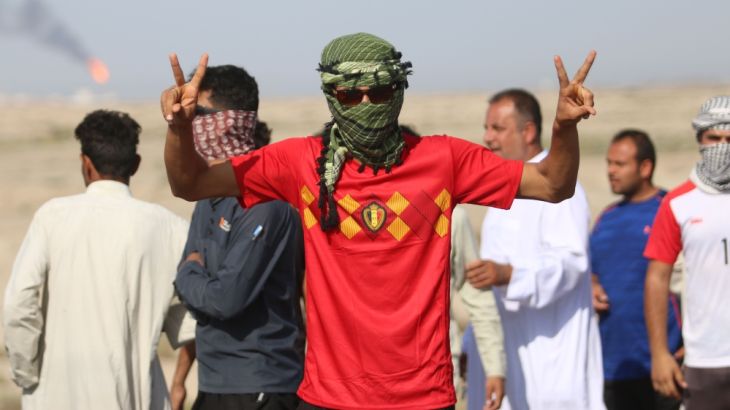Tear gas and water cannon fired at Iraqi protesters in Basra
At least seven people injured as unrest over jobs, poor services and corruption continues to flare in southern Iraq.

At least seven people have been injured in the oil-rich Iraqi city of Basra after police fired tear gas and water cannon at protesters rallying for better services and employment opportunities, police and activists have said.
In the latest in a week of daily protests against corruption and poor governance, hundreds of Iraqis gathered outside Basra’s main provincial government building on Sunday, before the situation quickly turned violent and security forces began firing in the air and used tear gas and water cannon.
“Some protesters tried to storm the building,” one police source told Reuters news agency.
“We prevented them by using water cannons and tear gas.”
According to the source, nineteen members from the security forces were wounded by stone-throwing protesters.
Activist Laith Hussein said the protesters numbered in the “thousands,” and managed to force the closure of the vital Umm Qasr port on the Gulf and roads leading to major oil fields to the north and west of Basra.
The mounting anger comes at a sensitive time as Iraqi politicians struggle to form a government following a May 12 parliamentary election tainted by allegations of fraud.
Prime Minister Haider al-Abadi, who is heading a fragile caretaker government until a new one can be formed, has announced that his government would release funds to Basra for water, electricity and health services in the suffocating summer heat.
|
|
Earlier this week, he announced investments worth $3bn for Basra province, as well as promises to provide jobs, housing, schools and services.
But so far, the protesters have ignored his concessions and taken the unusual step of attacking local government headquarters and buildings belonging to powerful Shia militias.
On Friday, they stormed and set fire to office buildings used by Prime Minister Haider al-Abadi’s Islamic Dawa Party, the Iranian-backed Al-Badr Organisation and the Shia Supreme Islamic Council Party, leading to the imposition of a curfew.
Al-Abadi, who also serves as the country’s commander-in-chief of the armed forces, dispatched reinforcement soldiers from both the Counter Terrorism Service and the Army’s Ninth Division to Basra late on Saturday and placed security forces there on high alert.
Qassim al-Araji, Iraq’s Interior Minister, told Al Jazeera that the government would not tolerate attacks against state institutions.
“Our duty is to provide security for all Iraqis, and also to listen to the demands and salute all protesters, but those who assault the institutions of the state and the security forces and its investments, disrupt the aspirations of the people, should be held to account.”
There are no real lines of communication between the two sides with the government doing nothing except holding talks while the prime minister is making promises which he is not implementing
Empty promises
Ranked the joint tenth-most corrupt country in the world by Transparency International, southern areas of Iraq has been gripped by protests over lack of jobs, the rising cost of living and an absence of basic services.
The region is home to the oil fields that account for the vast majority of the more than three million barrels of oil Iraq exports every day. Yet, it remains underdeveloped and has suffered from chronic power outages, poor water quality and uncollected waste.
Rampant electricity cuts have also exacerbated a sweltering heat wave, with Basra seeing temperatures exceed 48 degrees Celsius in recent days.
Saad Jawad, a professor of political science at the London School of Economics, said if there were no “concrete steps” taken by the government, protests would continue to flare.
Jawad said that the protests against the Shia-led government were taking place in Iraq’s Shia provinces, and that al-Abadi was politically “weak” in finding a solution.
“There are no real lines of communication between the two sides with the government doing nothing except holding talks while the prime minister is making promises which he is not implementing.
“The numbers of protesters and increasing and they are even threatening the Green Zone in Baghdad, Jawad told Al Jazeera from the UK capital.
“If the people don’t see concrete improvements in their lives that satisfy their demands – improvements in electricity, employment, services and actions against corrupt officials – they won’t stand down.
“The government needs to address their grievances.”
On Friday, protesters got a boost from Iraqi’s top Shia leader, Grand Ayatollah Ali al-Sistani, who offered solidarity with the people during a sermon.
“Basra is number one in providing the country with financial revenue,” said Abdel Mahdi al-Karbalai, the representative of al-Sistani.
“It is the number one in the number of martyrs and those who have been wounded in the fight against the Islamic State. So it is not fair, indeed it is not acceptable, that this governorate is one of Iraq’s poorest.”